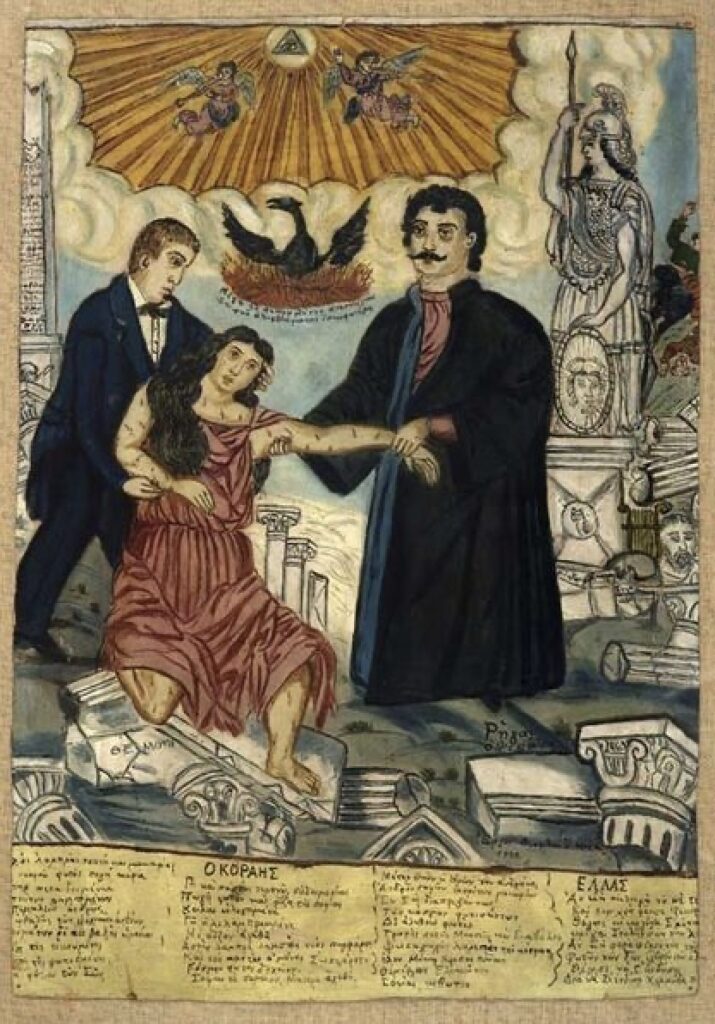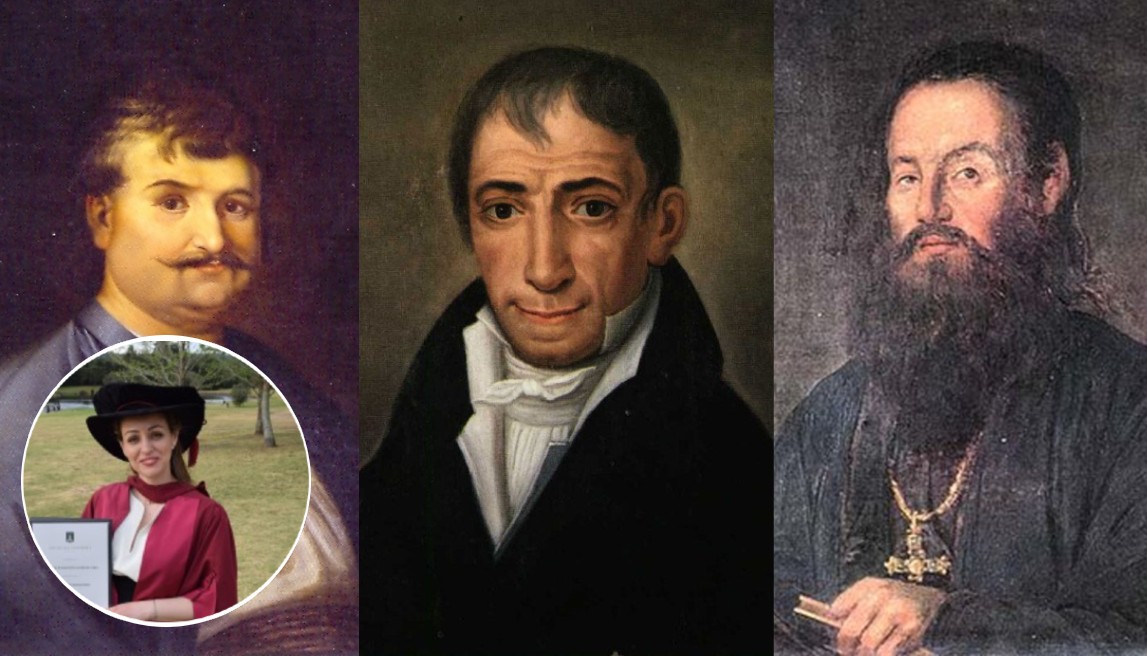By Dr Patricia Koromvokis
- As we talk about Greece’s war for independence, it is important to highlight the critical role that multiple intellectuals played in prompting the revolution and making sure Greece was able to prosper following their freedom. Who were some of the intellectuals who played a strong role during this time?
In the spirit of national uprising, which highlighted the path to the birth of the new Greek state, it is important to highlight all the revolutionary ideas and intellectuals’ aspiration through their voice and writings that prompt the Greeks to rebel for their religion, for their country, for their values, for their very own independence. Greeks were inspired and motivated both from ideas that were created during the 18th century, such as the Modern Greek Enlightenment, Romanticism, the French Revolution and from many intellectuals that were constantly motivating for a new modern Greece that would be free. There were innumerable intellectuals that played significant role in prompting the Greek Revolution in 1821. Few of the most influential ones are highlighted below.
Rigas Feraios was considered to be the forerunner of the Greek Revolution as he was the most influential writer and intellectual that actually invested in the unity among Greeks. Feraios wrote Greek articles for the newspaper ‘Efimeris’ in Vienna and he brought up the Greek nationalism after his death, through creating a war-song (poem), ‘Thourios’, which touched the hearts and souls of the Greeks, as it was a rallying cry for them against the Ottomans:
For how long, o brave young men, shall we live in fastnesses,
Alone, like lions, on the ridges in the mountains?
Shall we dwell in caves, looking out on branches,
Fleeing from the world on account of bitter serfdom?
Abandoning brothers, sisters, parents, homeland
Friends, children, and all of our kin?
[…]
Better one hour of free life,
Than forty years of slavery and prison.

Anthimos Gazis was an important Greek scholar, a true revolutionary and a politician. Gazis promoted education in Greece and he created the ‘Filomousos Etairia’ aiming at propagating the education as a whole, as an idea, in Greece. He provided funds for poor students, published works of classical literature and preserved antiquities. The organization influenced the spread of the ideas of the Modern Greek Enlightenment and indirectly promoted nationalism to all Greeks. Also, among his efforts to develop the Greek Enlightenment, was a lot of translations of different writings from foreign languages into Greek, and contributions to the first Greek philological periodical, ‘Hermes o Logios’, which played critical role during that time. In 1817, he joined the Filiki Etairia and returned to his homeland, where he recruited others in order to be prepared against the Ottomans.
Theoklitos Farmakidis was a Greek scholar and a journalist. He was a memorable intellectual of the Modern Greek Enlightenment that played major role in the motivation of Greeks as well. After Anthimos Gazis he continued the publishing of the Greek philological periodical, ‘Hermes o Logios’ together with his partner Konstantinos Kokkinakis. He joined the ‘Philiki Etaireia’. In August 1821, he started publishing the Greek newspaper ‘Elliniki Salpinx’ in Kalamata, he participated in the National Assemblies of the territories of Epidaurus and Astros and he went to Corfu during the period of 1823-1825 and taught in the Ionian Academy, which was the first Greek academic institution of that period.
Theophilos Kairis was a Greek Orthodox priest (from the theological school of Smyrna), a philosopher and a revolutionary. He is considered an important figure in the History of Modern Greece and one of the leading intellectuals of the Greek Revolution. From 1811 he led the teaching of the Greek language in high schools in Asia Minor and he took an active part in the Greek War of Independence. On May 10, 1821, Theophilos Kairis, declared the War of Independence by raising the Greek flag at the church of St. George of Andros. He inspired and motivated wealthy people to contribute funds and ships for the Greek War of Independence.
- Adamantios Korais was a Greek intellectual who had a large focus on preserving the roots of the Greek language, even contributing to the emergence of Katharevousa; a language still used by the Church of Greece and other Greek Orthodox Churches. Why was Adamantios Korais so important in regaining a new appreciation of Hellenistic culture and for the Greek language?
Adamantios Korais was a Greek humanist scholar, who was constantly reviving classicism that laid the intellectual foundations of the Greek War of Independence. His influence on the Modern Greek language and culture was so strong that he managed to aspire everyone. Korais was convinced that contemporary Greeks could find strength and unity only through a revival of their classical heritage. For that reason, he used his writings as a means of strengthening the feeling of Greeks towards the significance of their Greek heritage, their national aspirations and the value of education. Korais believed that the battle over language in French revolution was vital to fashioning a new vision of national identity. The language and the education of the nation became his preoccupations. He writes, “I learnt that the increase and spread of education in the French nation gave birth to the love of liberty.” Back to date, the Greek language was a discussion among the ‘archaists’ and supporters of a simpler language. Korais managed to create and publish the first Modern Greek dictionary, the ‘Atakta’. Korais’ inspiration led the way to the creation and adoption of the ‘Katharevousa’, as the official language of the state, by future scholars and the Greek state. Unlike many paternalistic Europeans, he wished to make Greece ready to receive. He dreamed of a new nation on a European model.
- Demetrios Chalkokondyles was one of the first to call for the liberation of Greece. How important can the voice or writings of intellectuals be in sparking change?
Under the Ottoman rule, Orthodox Christians were granted with some political rights but still would be considered as ‘inferiors’ to the Ottomans. Through the voice of all intellectuals and their motivational writings, all Greeks were inspired for fighting for their own independence and this was the beginning for the establishment of a new era. Demetrios Chalkokondyles was one of the most esteemed Greek scholars in the West, born in Athens and was one of the first to call for the liberation of the Greeks through composing orations and treatises. Specifically, in 1463, he called on Venice and ‘all the Latins’ to aid the Greeks against the Ottomans for the liberation of Greece. A great example of showing how intellectuals ‘raised’ a change is the foundation of the ‘Filiki Etairia’ in 1814. After Feraios’ martyrdom and his great influence to Greeks, three young Greek merchants, Nikolaos Skoufas, Emmanouil Xanthos and Athanasios Tsakalov, who were also inspired by the Italian organisation ‘Carbonari’, they founded the secret association ‘Filiki Etairia’, in which they planned the Revolution together with the support of wealthy Greek communities in Britain and U.S.A., and the aid of those who were sympathising Western Europe.
- Intellectuals during the War for Independence provided the history and described the emotions of Greeks during their struggle. These thoughts have been passed down and analysed by modern scholars. What is the role of modern scholars as we celebrate and look back at Greece’s liberation?
Greeks were clearly fighting for freedom, known as the Greek Movement for Independence. Women, men, children, everyone were fighting for their values, for their religion, for their country, for their families, for their freedom of expression, for their right to be independent.
Greek scholars were educated and influential members of the large Greek diaspora. Examples that we mentioned prior, such as Adamantios Korais, played a vital role in the Greek War of Independence. They tried to transmit classical ideas and values in a modern way to Greeks with the aim of both raising their educational level and also strengthening their national identity. This was achieved clearly through the dissemination of books and other writings in the Greek language. The intellectuals during the War for Independenceno longer appealed to reflection alone but were, above all else, calls for action. These intellectuals were the harbingers of new visions, of novel and this-worldly utopias, which became encapsulated in the Greek National Idea. The movement of the Modern Greek Enlightenment and its ideas of freedom and equality among the Greek-speaking populations living under the Ottoman rule and in communities abroad, was the pivotal beginning of everything. It is known that the Greek Revolution was the only one that had a successful end from all the liberal revolutions that took place during the time period of 1820-1822. Thus, during the 1820s, Greece became the starting point for international liberalism and inspired the ‘Philhellenism’ movement, which has infinite followers.
As we celebrate this year the 200 years since the Greek War of Independence we conclude that the Greek War of Independence was not only a fight against the Ottoman Empire but it was an agonas (αγώνας) for the preservation of diachronic values (αξίες) of freedom (ελευθερία), faith (πίστη), history (ιστορία), family (οικογένεια), education (μόρφωση), fame (δόξα). The role of modern contemporary scholars is not to revive scholarly and political interest in culture but to inspire (έμπνευση) the new generation to re-value the aforementioned diachronic values of human society. And this can happen only when modern scholars will become role models such as Rigas Feraios and Adamantios Korais, according to them, the solution to the Greek Independence was education. Slavery was caused by ignorance!

